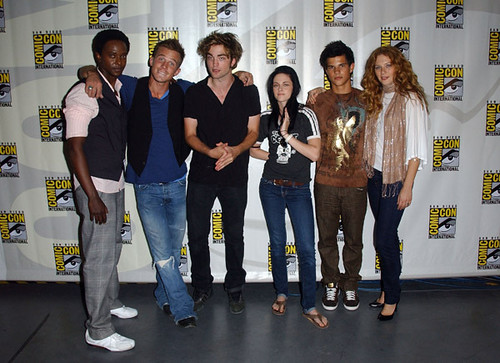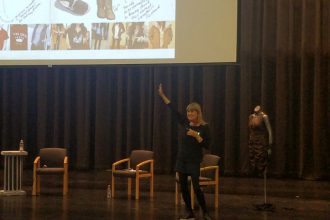TWILIGHT AND COMIC CON
Came across this article on Twilight and Comic Con. The stars of Twilight spent several years attending the event and it became one of the biggest Twilight Fan Events. I have heard stories from several friends of camping out, long long lines and of course Hall H with its several thousands of people. Since Twilight is no longer in attendance it is interesting to see what will become of Comic Con. This year some of the Twilight actors were there with other movies. Great article read.

Were the Twilight movies good?” is not a question I want to even ask right now. It’s too complicated, with too many extremist perspectives on either side. There are the kids who grew up with the Twilight phenomenon as their entire teenage pop culture prism. (Remember: Thanks to the annual-ish release strategy and the real-life romance angle and the fact that Twilight soundtracks were sort of a thing, Twilight as experienced by teenagers was this weird post-millenium mixed cocktail of the Beatles and Elizabeth Taylor/Richard Burton and whatever teen-drama TV show you thought was awesome when you were a dumb teenager.) And there are the slightly older, hipper kids who will maybe never forgive Twilight for making a dumber Buffy the Vampire Slayer into a more popular Buffy the Vampire Slayer.
I’m sort of a soft Twilight partisan; I liked how the series stuck out from the crowd of Hollywood blockbusters, how they trended anti-kinetic and campy and romantic and cheap at a moment when most big movies were duded-out emo-grunge spectacles. That’s why I like Eclipse the least–it’s the closest the series ever came to being just another a contemporary gritty action movie–and why I find the screensaver gauze of New Moon so oddly beguiling. (The entire narrative of New Moon would barely fill a C-plot in an episode of The Hills.)
But right now this week, the more interesting question is: “Were the Twilight movies good for Comic-Con?” Important Note: It’s tricky to make any grand sweeping statements about Comic-Con, mostly because it’s only really possible to make grand sweeping statements about Comic-Con. The event physically takes place across four-and-a-half days in the San Diego Convention Center, and culturally takes place within the infinite space-time of the internet.
No one person can see everything at Comic-Con. If you look at the panel schedule, there appears to be roughly a dozen things happening simultaneously, continuously–and that’s not counting what’s happening on the floor, or the various events that have sprung up around Comic-Con. The big Hollywood projects get all the press, but that’s just because the press were sent there to report on big Hollywood projects. Comic-Con is a bit like Las Vegas: It feels like a metaphor for something, but nobody knows what, and anyhow most people just want to gamble/dress up like their favorite superhero.
A few years ago, though, there was a pretty clear narrative on Comic-Con (it’s getting bigger) which came with its own cool-kid anti-narrative (it’s getting too big!) And there are a few hundred reasons behind both those narratives, but the unifying whipping boy was Twilight. The franchise arrived at Comic-Con in 2008. It shared a panel with the forgotten telekinetic thriller Push (starring future Twilight baddie Dakota Fanning and future Captain America Chris Evans); other films shown off at Comic-Con 2008 included Terminator: Salvation, The Mummy: Tomb of the Dragon Emperor, and Watchmen. Reading contemporary reports about the film’s panel, you find a lot of confusion (what is this movie doing here?) and more confusion (why are there so many people cheering so loudly for this movie I’ve never heard of?)
Time passed. The lines for Twilight became historic; in 2009 and 2010, you started hearing the stories about how the line for Hall H was becoming a self-sustaining Hooverville economy, with Twihards waiting in line for days hoping to catch a glimpse of Pattinson/Stewart et al. By then, people who didn’t care about Twilight cared enough about Twilight to be outraged by Twilight and its presence at a convention that had heretofore been free of glitter-vampires and the moody gals who love them. Thus began the meme of “What is [thing I don’t like] doing at Comic-Con?” Why was Glee at Comic-Con? Why was How I Met Your Mother at Comic-Con? Why was Castle at Comic-Con? Oh, Nathan Fillion’s in that? Well, okay, but why is Glee at Comic-Con?
I went along with that line of thinking. It was easy to construct a narrative around Comic-Con “selling out,” although that phrase had a hazy definition when applied to a large event devoted to our culture’s advertising fetish. There was a sense that Comic-Con’s glorious past had been replaced by a vaguely dystopian future; there was a sense that something had invaded, though it was hard to say whether that “something” was Hollywood or teenagers or anything that wasn’t a comic book. The whole “not a comic book” thing was obviously bunk–a program schedule from the original version of Comic-Con promises a screening of The Lost World (not what you think) and a Flash Gordon serial–but it was also a handy talking point. And so was Twilight.
Flashforward to this year’s Comic-Con. This was not a particularly exciting Comic-Con and not a particularly unexciting Comic-Con. There were no Batman vs. Superman-level surprises and no Green Lantern-level buzz implosions. But this was the Comic-Con where American Horror Story finally arrived in San Diego, which also means that this was the Comic-Con where Kathy Bates got a standing ovation. This is simultaneously not a thing and a huge thing. Not a thing: Standing ovations at Comic-Con are cheap. A huge thing: Kathy Bates got a standing ovation. And she got it for a show filled with incredible actresses, many of them past the age of squeezing into skintight spandex. It’s hard to know where something like American Horror Story would have fit into Old Comic-Con; this year, I saw a long line of people despondently waiting to fit into the small corner room where the AHS panel took place. (Bet you next year they move to Ballroom 20.)
There’s a straight-white-dude vibe to a lot of the complaints about What Happened To Comic-Con, like we’re all Michael Douglas in Falling Down confused and scared by the new world of geeks who don’t all look like us and like the things we like. Comic-Con has gotten much bigger–but the flip side is that it’s gotten much more interesting. Certainly, it’s feels like it’s welcoming more kinds of people. This was the year that “harassment” became an actual topic of conversation. A few years ago, Adventure Time aired a gender-flipping episode where lead dude Finn became lead gal Fionna, which means this was the third straight Comic-Con where I saw more Fionnas than Finns.
Is this all a direct response to Twilight? I think yes. When you think of fandom pre-2000, the idea of a fan is split pretty cleanly: There’s the Fan-As-Living-Encylopedia, who can spout minutiae from Steranko’s entire run of Nick Fury, Agent of S.H.I.E.L.D.; and there’s the Fan-As-Living-Freakout, the screaming hordes in A Hard Day’s Night who love the Beatles so much they start crying. Twilight at Comic-Con somehow fused those two fandom aesthetics into one; you could camp out for days speaking with serious fluency about the changes made from book-to-film, but you could also scream into near-unconsciousness whenever Pattinson answered a question. Anyone could be a megafan of anything–and more and more, “anything” was going to be at Comic-Con.
You can complain about a lot with the newer, bigger Comic-Con, I guess. I’m hesitant to offer some sort of “how to fix” solution to the Comic-Con organizers, since running Comic-Con seems like the equivalent of governing a city that appears out of nowhere and is exclusively populated with insane people. Sure, there has to be some kind of way to assure that fans of a project get to see that project’s panel. (Maybe the solution is in the rift.)
But I don’t really know how you “fix” an event where people pay money to get sold things. The best thing you can do is open the door as wide as possible. And Twilight blew the hinges off, one glowing vampire kiss at a time.

